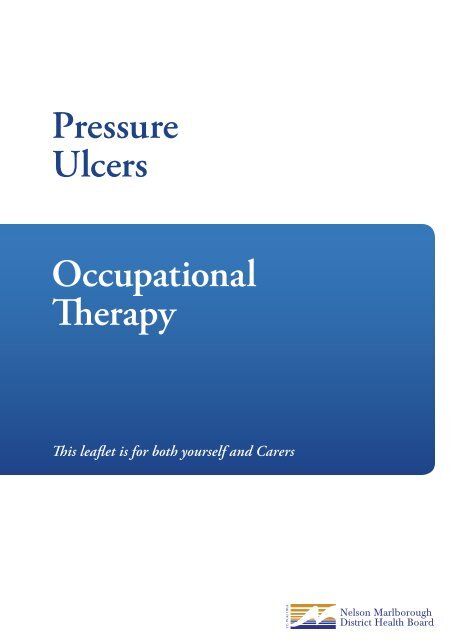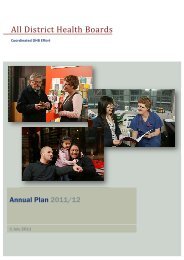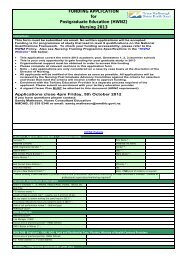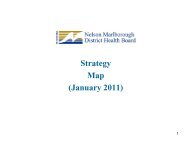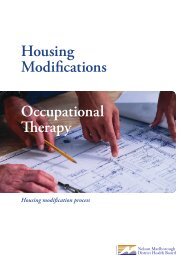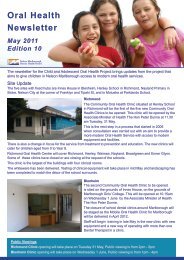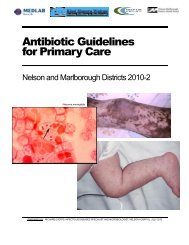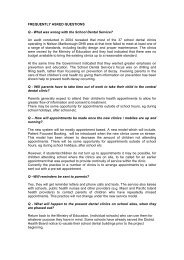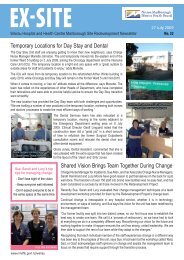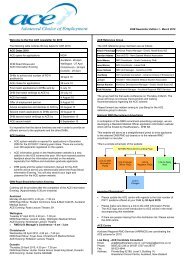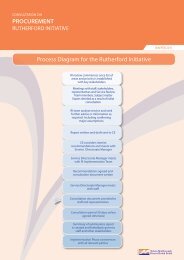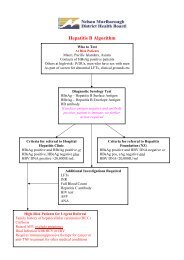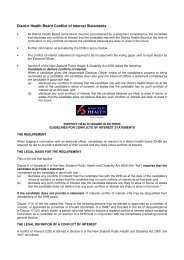Pressure Ulcers Occupational Therapy
Pressure Ulcers Occupational Therapy
Pressure Ulcers Occupational Therapy
You also want an ePaper? Increase the reach of your titles
YUMPU automatically turns print PDFs into web optimized ePapers that Google loves.
<strong>Pressure</strong><br />
<strong>Ulcers</strong><br />
<strong>Occupational</strong><br />
<strong>Therapy</strong><br />
This leaflet is for both yourself and Carers
Contents<br />
What is a pressure ulcer? 3<br />
Who is at risk of developing a pressure ulcer? 4<br />
How can I avoid developing a pressure ulcer? 5 & 6<br />
Where might I develop a pressure ulcer? 7<br />
What else can I do? 8 & 9<br />
Individual recommendations 10
3<br />
What is a<br />
<strong>Pressure</strong> Ulcer?<br />
A pressure ulcer is an area of damaged tissue. It is caused by being in<br />
the same position for too long without moving. In some people this may<br />
not just be damage to the surface of the skin, but the deeper layers of<br />
tissue under the skin may also be affected. They are also known as<br />
bedsores or pressure sores.<br />
What are the Causes of a <strong>Pressure</strong> Ulcer?<br />
Prolonged unrelieved pressure<br />
The weight of the body can squash the skin and tissues causing<br />
damage.<br />
Shearing<br />
When you slide down the bed or are dragged up the bed, this may cause<br />
a strain on the skin and tissue layers. This may cause damage.<br />
Friction<br />
This occurs when two surfaces rub together i.e. skin rubbing against a<br />
chair or bed.
Who is at risk of<br />
developing a <strong>Pressure</strong> Ulcer?<br />
Anyone who has a lack, or limited, mobility<br />
This may be as a result of:<br />
• Having to stay in bed<br />
• Being in a wheelchair<br />
• Having difficulty in moving around<br />
• Spending long periods of time in an armchair<br />
• Having a serious illness<br />
• Being elderly or frail<br />
• If you have diabetes or have had a stroke – your<br />
body may become less sensitive and you may<br />
not feel the need to change position<br />
• If you have had a pressure ulcer in the past, then<br />
this area of skin is at risk of further pressure<br />
development<br />
• Having moist or damp skin. This is usually caused by not<br />
drying well after washing, sweating or through incontinence<br />
• Being under or over weight<br />
• Not eating a balanced diet<br />
• Not having enough to drink<br />
4
5<br />
How can I avoid<br />
developing a <strong>Pressure</strong> Ulcer?<br />
The best way to avoid developing a pressure ulcer is to get out<br />
of your bed or chair and walk for a short distance at least every two<br />
hours, or at least change your position. This will allow the blood to flow<br />
and help tone up your muscles. Your district nurse will advise about<br />
your own needs.<br />
If you are in bed:<br />
• You should change your position as often as your district<br />
nurse has told you to. Alternate between lying on your<br />
back and your side. You may need help to do this, to<br />
prevent dragging your skin along the sheets.<br />
• Use pillows to stop your knees and ankles touching,<br />
especially when you are lying on your side, as this can<br />
cause soreness on the skin.<br />
• Take care to avoid crumbs in the sheets.<br />
• If you sit up in bed, make sure you do not slide down as this<br />
can drag on your buttocks and heels, causing soreness.<br />
• Keep your skin clean and dry<br />
• It is important that your carers know how to help you and not<br />
put themselves at risk. A healthcare professional will be able<br />
to help advise you.<br />
General:<br />
• Dry well after washing, sweating or through incontinence<br />
• Keep within a healthy weight range<br />
• Eat a balanced diet<br />
• Drink plenty of fluids.
If you are in a wheelchair or armchair:<br />
How can I avoid developing a <strong>Pressure</strong> Ulcer?<br />
Take the weight off your buttocks every half hour by...<br />
• Leaning forward and pushing up on the arms of your chair –<br />
or roll from side to side for a while.<br />
• Use the correct size armchair to give support to your spine<br />
and shoulders.<br />
• Your knees should be level with your hips and bent at 90º.<br />
Your feet should be flat on the floor.<br />
• If you need more advice on seating your occupational therapist<br />
can help.<br />
6
7<br />
Where might I<br />
develop a <strong>Pressure</strong> Ulcer?<br />
Heels >> Buttocks >><br />
Ankles >> Base of spine >><br />
Knees >> Elbows >><br />
Hips >> Shoulders >>
What else<br />
can I Do?<br />
• Eating a well balanced health diet is important. It helps your<br />
skin to stay strong and healthy – remember to have plenty<br />
of fluids.<br />
• If you are unable to move yourself seek help. This can be from your GP,<br />
physiotherapist, occupational therapist or district nurse. Your doctor’s<br />
surgery or health centre will advise you of the best person to help you.<br />
8
9<br />
What else can I do?<br />
• If you are worried about your skin or think you may be getting a<br />
pressure ulcer, seek help and advice. Your doctor’s surgery will help<br />
you contact the best person.<br />
• Try to avoid rubbing or massaging your skin too hard especially over<br />
the bony parts. Pat skin dry after washing or bathing.<br />
• It is better not to use creams unless a doctor or nurse has<br />
prescribed them.<br />
• Do not use talcum powder as it soaks up the natural oils in the skin<br />
and dries it out.<br />
• For areas that are too hard to see, use a mirror or ask your carer to<br />
check for you.
Individual<br />
Recommendations<br />
10
A Tip for Success<br />
If you find that you a have a pressure ulcer, try not to worry.<br />
If you get the right treatment, advice and take care of yourself,<br />
a pressure ulcer can be healed.


